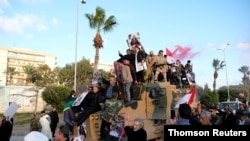Libyan fighters allied with the country's U.N.-supported government in Tripoli pressed their advance on Monday, boosted by recent battlefield gains and their rivals' withdrawal from around the capital, the warring sides reported.
The push came despite a unilateral cease-fire proposal over the weekend by Egypt, a backer of the rival Libyan forces commanded by Khalifa Hifter, who has waged a year-long campaign, trying to capture Tripoli from the militias allied with the U.N.-supported but weak government.
The Tripoli forces, backed by Turkey, gained the upper hand last week after retaking the capital's airport, all main entrance and exit points to the city and a string of key towns near Tripoli, forcing Hifter's fighters to withdraw — defeats their command painted as a tactical measure to give the U.N.-backed peace process a chance.
Egypt's proposal, announced by President Abdel-Fattah el-Sissi on Saturday, envisaged a cease-fire starting Monday. Hifter accepted it, as did Aguila Saleh, speaker of the country's east-based parliament.
But the militias fighting to defend Tripoli rejected the proposal, instead pushing eastward toward the coastal city of Sirte, a former stronghold of the Islamic State group that Hifter's forces captured in January.
Tripoli-based Interior Minister Fathi Bashagha said the government side would engage in political talks only after taking Sirte and also the inland Jufra air base, to the south. The U.S. last month accused Russia of deploying at least 14 aircraft at the base to support Russian mercenaries backing Hifter, a claim dismissed by Moscow.
Taking Sirte would open the gate for the Tripoli-allied militias to press even farther eastward, to potentially seize control of vital oil installations, terminals and oil fields that tribes allied with Hifter shut down earlier this year, cutting off Libya's major source of income.
Libya's national oil company meanwhile said Sunday it has resumed production at the country's largest oil field, after negotiations with the tribes. The National Oil Corporation said the first production phase at the Sharara oil field, about 900 kilometers (560 miles) south of Tripoli, would start at a capacity of 30,000 barrels a day, and the field is expected to return to full capacity, around 290,000 barrels a day, within three months.
Allowing the Tripoli-based company to resume oil production could be seen an olive branch to the government in the Libyan capital, which suffered heavy financial losses, estimated at about $5.2 billion, since the closure.
Libya's Prime Minister Fayez Sarraj urged the Tripoli fighters to "continue their path" toward Sirte, according to a statement posted by Mohamed Gnono, a spokesman for the Tripoli-allied forces. Gnono posted footage of allegedly captured tanks and vehicles in the outskirts of Sirte.
Hifter's military media unit, however, said his forces destroyed a military company that included Turkish-made Hausers and tanks, along with a bus allegedly carrying Turkish troops and Syrian mercenaries who have been aiding the Tripoli militias.
The push on Sirte shows the Tripoli-based government and its main backer, Turkey, are eager to build on their recent victories.
Libya's east-based forces are backed by the United Arab Emirates and Egypt, as well as France and Russia. The Tripoli-based government receives aid from Qatar, Italy and Turkey, which stepped up its military support in recent months, helping shift the tide of the conflict.
Sirte was the hometown of Libya's former dictator Moammar Gadhafi, killed in the 2011 uprising. The city was later controlled by Islamic militants who pledged allegiance to IS, until they were defeated in 2016.
But Libya's turmoil continued, and the oil-rich country has since been divided between rival administrations in the east and west, each is backed by foreign countries.
Libya's Tripoli Forces Press Gains Despite Egypt Truce Offer




